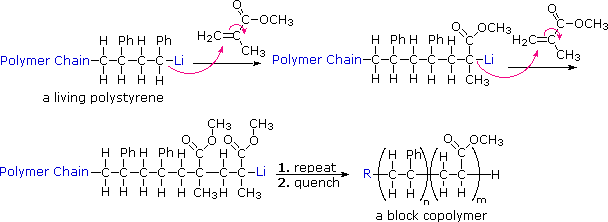Discovering the Varied Applications and Advantages of Polymers in Different Industries
Polymers, with their varied array of residential or commercial properties and performances, have actually ended up being crucial in various industries, each gaining unique take advantage of their application. Polymers. From enhancing safety and efficiency in the auto field to changing clinical tools in the health care market, polymers play a critical function. Furthermore, their eco-friendly nature is altering the landscape of sustainability techniques. As we explore the depths of polymers in electronic devices, we reveal sophisticated advancements, while their structural stability changes the world of building and infrastructure. The pervasive impact of polymers throughout sectors is a testament to their flexibility and adaptability, shaping the future of many industries.
Automotive Industry Applications
Polymers play a crucial role in enhancing the efficiency and resilience of different parts within the automotive industry. One famous usage of polymers in the auto sector is in the production of lightweight components.

Medical Care Industry Advantages
In various health care applications, the advantages of making use of polymers are extensively identified for their varied range of advantageous properties. Polymers play an important role in the medical care sector as a result of their convenience, biocompatibility, and cost-effectiveness. Among the key benefits of polymers in medical care is their capacity to be customized to details needs, such as versatility, longevity, and biodegradability, making them suitable for a variety of medical applications.
Polymer-based materials are extensively made use of in clinical devices, such as catheters, implants, prosthetics, and medicine distribution systems, as a result of their biocompatibility and capability to simulate natural tissues. These materials can reduce the threat of allergies or beings rejected, enhancing individual security and outcomes. Additionally, polymers are light-weight, making them appropriate for wearable medical tools and making certain person comfort.
Furthermore, polymers make it possible for the development of cutting-edge therapy techniques, such as hydrogels for cells engineering and nanocomposites for targeted medicine delivery. Their convenience of processing and sanitation makes them vital for keeping high standards of health in healthcare settings. On the whole, the varied benefits of polymers contribute substantially to developments in medical technology and individual treatment.
Environmental Advantages of Polymers

Additionally, polymers can contribute to energy cost savings as a result of their light-weight nature. In industries such as transportation, lightweight polymer products can help in reducing fuel consumption and greenhouse gas emissions. Furthermore, polymers can allow the advancement of energy-efficient products such as insulation materials that improve energy conservation in buildings.
Furthermore, polymers play a critical duty in minimizing water air pollution. The usage of polymer-based filtering systems can efficiently eliminate pollutants click for more and impurities from wastewater, guarding water sources and environments. Generally, the environmental benefits of polymers make them beneficial properties in promoting sustainability and environmentally friendly practices throughout numerous markets.
Polymers in Electronics and Technology
Taking into consideration the boosting need for innovative and sustainable services in modern sectors, the combination of advanced polymer innovations in the realm of electronic devices and innovation has actually arised as a pivotal technique for driving efficiency and efficiency. Polymers have actually reinvented the electronics market by making it possible for the manufacturing of lighter, much more adaptable, and long lasting digital gadgets. From smartphones to clinical gadgets, polymers play an important role in improving item style and capability.
One considerable benefit of polymers in electronic devices is their protecting buildings, which assist shield delicate digital parts from environmental variables and electric disturbance. Additionally, polymers are my response necessary in the development of versatile screens, wearable technology, and published electronic devices, providing limitless possibilities for producing wise and interconnected tools.
In addition, the usage of polymers in digital product packaging has resulted in innovations in miniaturization and thermal management, enhancing the overall efficiency and integrity of digital systems. As technology remains to progress, the versatility and versatility of polymers will most certainly drive even more development in the electronic devices market, forming the future of modern technology.
Duty of Polymers in Construction and Facilities
The integration of sophisticated polymer materials in building and facilities jobs has actually reinvented the method frameworks are created and integrated in modern-day times. Polymers use countless benefits in the building and construction market as a result of their convenience, toughness, and cost-effectiveness. One crucial function useful content of polymers in building is their use in coverings and sealants, offering protection versus ecological aspects such as wetness, UV radiation, and rust. Additionally, polymers are used in the manufacturing of lightweight and high-strength composite products, boosting the structural integrity of structures while reducing overall weight.
Furthermore, polymers play an important role in lasting construction techniques by allowing the development of energy-efficient frameworks. Insulating products made from polymers help manage indoor temperatures, reducing the need for home heating and cooling down systems and ultimately decreasing energy consumption. The usage of polymer-based compounds in infrastructure tasks such as bridges and roads improves their long life and decreases upkeep prices. In general, the unification of polymers in building and framework showcases their substantial influence on modern-day design practices.
Conclusion
In final thought, polymers play an essential role in various industries such as automotive, medical care, ecological, electronics, and construction. From improving fuel performance in automobiles to boosting medical tools, polymers offer countless benefits.